I always thought that The Last of Us was an overrated video game. It was good, sure, don't get me wrong. But I never thought that it was the "pinnacle of story-telling in gaming", as many of its biggest fans suggested. To me, it was a good zombie story about the risk of closing ourselves off from each other, which was stapled to a good cover-based shooter. But, to me, the whole always felt like less than the sum of its parts. The gameplay of The Last Of Us was always more about setting a tone than about telling the story. And if your gameplay isn't helping to tell the story, then, as far as I'm concerned, you're not a particularly good example of the interactive video game medium.
So when HBO announced that it would be producing a TV mini-series adapting The Last Of Us, my initial reaction was "why bother?". Like with so many modern remakes, reboots, and adaptations of barely 10-year-old media, I felt like the original is fine, and if you want to watch a Last Of Us movie, you could just hop on YouTube and watch a compilation of all the cutscenes. Honestly, you wouldn't be missing much by ignoring any of the actual game -- let alone by not playing it yourself.
Very little of The Last Of Us' gameplay informed the story in any meaningful way.
Well, HBO's streaming series manages to simultaneously vindicate that feeling, while also showcasing that The Last Of Us does actually benefit from being adapted into the medium that it was always better suited for anyway. The creators of the video game, themselves, in adapting the game, basically cut out all of the actual video game. Virtually nothing that the player ever has to do in The Last of Us was translated to the TV show. It's as if all the actual video game was never really important at all to telling the story. The TV show basically adapts all the cutscenes, telling the same basic story -- sometimes better than the game did -- and without all the meddlesome video game getting in the way.
In the entire 10-episode mini-series, there is [I think] two scenes of our characters having to sneak past infected -- one of which is a flashback. And not a single one of the multitude of scenes in which Joel and Ellie are ambushed by random raiders is adapted at all. Seriously, the characters keep talking about how dangerous it is outside of the quarantined cities because of raiders, but yet we never once see any actual raiders. The closest we come is the ambush by the revolutionaries in Kansas City. Then there are a couple scenes of Joel and Ellie getting ladders or unlocking doors for each other, which was about the only part of the game that ever contributed to the story-telling by reinforcing the relationship and growing inter-dependence of the characters.
Under most circumstances, I would say that adapting a game by cutting out so much of the game would be a "bad thing". In this case, however, it isn't. It might actually be an improvement. I always felt like the bulk of the gameplay in The Last Of Us was just filler anyway. All the actual story -- all the stuff that everybody remembers and loves -- happens outside of the player's control.
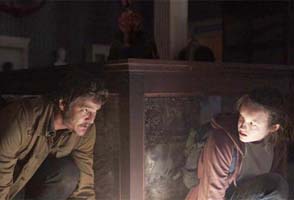 The Last Of Us Episode 2, © HBO, Sony Television.
The Last Of Us Episode 2, © HBO, Sony Television.
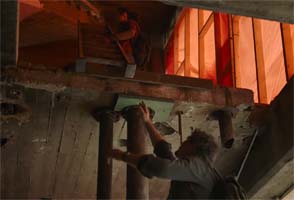 The Last Of Us Episode 9, © HBO, Sony Television.
The Last Of Us Episode 9, © HBO, Sony Television.
Very little of The Last Of Us' gameplay was adapted into the TV show.
The growing fungal threat
The TV mini-series doesn't only cut gameplay content out; it also adds quite a bit new story, and changes things here and there. There are a lot of flashbacks to the days before the outbreak, and to the early days of the outbreak. These serve to provide additional characterization for Sarah, in order to make her a more fully-fleshed out character. It also provides backstory regarding the origin of the mutated cordyceps, and why Ellie is immune.
When The Last of Us released back in 2013, the idea of a cordyceps apocalypse was kind of laughable. Fungi can infect insects, but they cannot survive in the warmer bodies of mammals. The worst that humans have to worry about is topical infections like athlete's foot or yeast infections.
However, as the show points out in its opening minutes, there is actual growing concern from infectious disease experts that climate change could actually cause fungi to become a serious infectious hazard to humans. The reason for this is that the rising temperatures of the Earth (due to human-induced climate change) is causing many fungal species to adapt to warmer temperatures. Even just adding a couple extra degrees of temperature tolerance would be enough for certain fungi to survive in the warm-blooded bodies of mammals and cause serious illness. Cordyceps would need a lot more mutation than just a couple extra degrees of temperature tolerance in order for it to become a threat to humans, but other fungi (such as the yeast Candida Auris) have already begun causing serious illness to humans. [More]
0d94fce5-da5d-42fb-b476-9fdd748b75d8|5|3.6
Tags:fungus, The Last of Us, HBO, HBO Max, streaming television, Pedro Pascal, Bella Ramsey, Nick Offerman, zombie, cordyceps, fungus
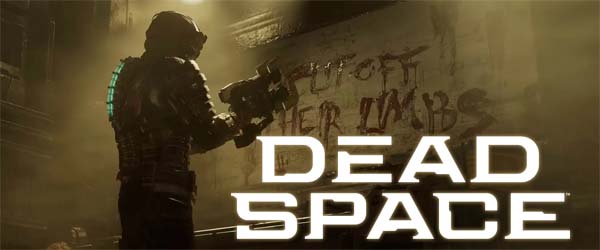
I'm gonna be perfectly honest with you right up front: I'm coming into this review with a negative bias. This is a remake that does not need to exist. Dead Space is only 10 years old, is an HD game that still looks fine. It is designed around gameplay conventions that are still standard practice today, and so the original still holds up well, outside of some mildly-dated presentation. I get the desire to remake or re-imagine older games that actually are dated, like Resident Evil 2 or Final Fantasy VII, which were both completely redesigned with modern gameplay conventions and (in especially in the case of Final Fantasy VII) bold new creative and narrative decisions. I would also understand the desire to go back and take another stab at more recent games which are really good, but which may have been virtually unplayable due to technical problems. Fallout: New Vegas comes to mind.
But this recent fad of rote remasts or remakes of PS3-era games that were already highly-polished and still modern-feeling (and thus hold up well today) just feels like lazy, cynical cash-grabs to me. Games like Dead Space, The Last of Us, and Mass Effect just feel like completely unnecessary remakes -- especially if they're going to be direct recreations of the original with little-to-no creative liberty. Heck, even the Demon's Souls remake feels unnecessary. I would much rather than Sony and FromSoft just release a digital version of the PS3 game on the PS4 and PS5 storefronts and keep the servers going. Maybe even patch the PS3 game with some of the ease-of-use features that were added for the PS5 remake. I'm still on the fence about Silent Hill 2 and Resident Evil 4, since those remakes might take enough creative liberty to justify their existence (assuming they don't shit the bed in doing so). As such, I did not buy this remake of Dead Space retail. I bought a used, second-hand copy in order to save a few bucks and to not give money to EA (and so as not to seem to give implicit support for this trend of unnecessary remakes).
Coming off of Callisto Protocol, Dead Space feels like a masterpiece.
All that being said, having just recently come off of playing through The Callisto Protocol, the difference is night-and-day. This Dead Space remake is, by far, the much better game. It's a good remake of a good game, and it's a good survival horror game in its own right.
Mostly how I remember it
Dead Space is a pretty straight-forward, by-the-numbers recreation of the original game, with only a few creative liberties taken. It's still a 3rd person shooter built around the challenge of shooting off the limbs of zombies and monsters instead of aiming for the center of mass or going for head shots. The story, mission structure, map, and many set pieces will all be completely recognizable to anyone who played the original game, even though some things here and there might be a little different.
As such, pretty much any review of the original Dead Space still holds mostly true here. All the things that I liked about the original game are still present. Unfortunately, I never reviewed the first Dead Space on this blog, so I can't just link you to that. I'll have to just summarize my feelings here.
Isaac is fully voiced and has more agency compared to the original.
The enemies are threatening, and the combat is challenging. The non-traditional weapons, combined with kinesis and stasis and creative enemy design, provide a lot of variety and strategy in combat that goes far beyond just "shoot bad guy in the head". The setting and lighting really help to sell the sci-fi horror aesthetic. The in-universe, diegetic, holographic interface holds up well and never pulls the player out of the immersive environment. The Ishimura itself still feels like a believable, functional place. The story is derivative, cliché, and cringe-worthy in some parts, but I do like the religious undertones and parody of Scientology. [More]
fd3c4399-577e-4a0d-b05d-256753797daf|1|5.0
Tags:Dead Space, Electronic Arts, Motive, Visceral, remake, horror, survival horror, science fiction, shooter, zombie, necromorph, dismemberment, religion, Scientology, Unitology
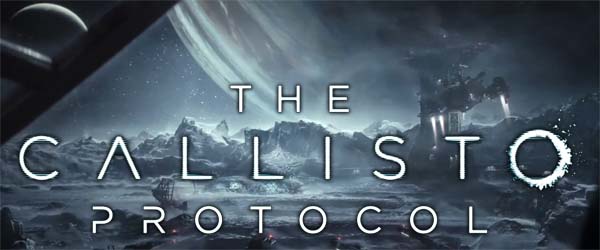
I saw a lot of social media posts in the days after Callisto Protocol's release complaining about the game being awful. Some said it was buggy and riddled with performance issues. Others said it was just a bad game, and would be bad even if it were stable.
I didn't experience a lot of the technical issues (on PS5) that others were reporting. But I also didn't start playing till later that weekend, so had the benefit of the day-1 patch. Maybe that fixed a lot of the technical complaints? Yeah, there were still some lingering technical issues, but they were mostly nagging problems that I could look past.
So I went through most of the first half of the game thinking "This ain't so bad." It wasn't very good either. But it seemed like it was being unfairly maligned. It's Dead Space, but just ... not good.
Callisto Protocol is borderline plagiarism of Dead Space, but not a very good copy.
But as I got into the middle of the game's campaign, my opinion began to change. The issues and frustrations mounted until they boiled over in the game's first boss fight (which doesn't happen until more than halfway through the campaign). Callisto Protocol is just not very well designed or though-out. It suffers at fundamental levels of gameplay design.
Space Zombie Punchout
Callisto Protocol's problems start with the awful melee and dodge system -- which is kind of the whole gimmick of the game. Instead of pressing a button to trigger a dodge, the character automatically dodges left or right if the player is pressing the left analog stick left or right (respectively when the enemy makes an attack. The character will also block if the player is pressing backwards when the enemy attacks.
It's a system that feels more like Mike Tyson's Punchout than any action shooter I've ever played. But where Punchout is a boxing game that features a stationary opponent ducking left or right to dodge the punches of a single opponent lined up directly in front of you, Callisto Protocol is ... not that. The character in Callisto Protocol is ambulatory, and attempting to navigate an environment while also fighting multiple enemies at both melee and at range.
I could not get the hang of which direction I should be dodging -- except against bosses.
I found it very difficult to get the hang of the melee combat -- at least outside of boss fights. Strangely, the boss fights seemed to have the most clearly telegraphed attacks and reliable dodging. Outside of boss fights, however, enemies are frequently zombie-like monsters that rush at the player and shamble around, making it difficult to read their movements. As such, I never know which direction to dodge. And even when I do seem to correctly dodge, I sometimes take damage anyway, which leads to the next big problem. Pretty much every time I had to engage in melee combat, I would die and have to retry.
[More]
7280ae0d-0d27-4b73-bd65-d0a7184a805a|2|3.0
Tags:The Callisto Protocol, Striking Distance Studios, Krafton, quicktime event, melee, dodge, science fiction, horror, shooter, zombie, arcade, Dead Space
I don't think that Capcom and Naughty Dog realized just how topical their 2020 releases of Resident Evil 3 and The Last Of Us Part 2 would turn out to be. Both games were released in the spring and summer, as a strange novel coronavirus (believed to have jumped from Chinese bats to people) began to spread within the United States and the rest of the world. Both games are about zombie apocalypses, and were released at a time in which large portions of the global economy had been shut down, and residents were expected to essentially shelter in place in their homes for weeks or months to prevent the spread of the pandemic. The 2020 pandemic (which is still ongoing 18 months later, despite the widespread availability of multiple vaccines), provided me with some unexpected context on these two games.
Check out the video essay version of this post on YouTube.
Both games are zombie apocalypse games, and zombie fiction is often based around fears and anxieties of societal collapse in one form or another. The original Night Of The Living Dead channeled the anxieties of nuclear Armageddon, and filtered them through the lenses of both McCarthy era Communist witch-hunts and a degree of racial tension. George Romero's Dawn Of The Dead channeled fears that consumerist culture would lead to toxic behavior that is not only self-destructive to the individual, but also to society at large. Zombies in other fiction might represent anxieties about racism, sexism, socialism, technology gone amok, and so forth.
Zombie fiction is usually inspired by contemporary fears surrounding societal collapse.
Video game zombies are no different, and they can represent any of those anxieties from a simple narrative standpoint. Because games are an interactive experience, zombie games can even explore anxieties about a loss of individual autonomy in ways that non-interactive media would struggle to approach. But I'm not here right now to talk about zombie games in general. I want to talk specifically about the pare of blockbuster zombie games that released last year, during the height of a real-life pandemic.
Both Last of Us games express concerns about the increasingly myopic "us and them" mentality in American culture and politics and the apparent inability of many people to empathize with others and see their point of view -- or even their humanity. And Resident Evil, as a series, channels anxieties about the self-destructive nature of the corporate desire to make profit at all costs, and then use their vast wealth and lobbying power to cover up their unethical activities.
Regardless of the messages intended by the developers, playing both of these games in 2020 made it really hard for me to not look at them both through the lenses of my own anxieties about the contemporary pandemic situation that we saw (and continue to see) ourselves in. It was a situation that neither game's developers could have foreseen (even though scientists, public health experts, and futurists have been sounding the alarm bells for the inevitability of pandemics in our increasingly globalized world). Anyway, since neither Capcom nor Naughty Dog could foresee that the games would launch in the middle of a real-world pandemic, they didn't really design their games around the ideas and anxieties of a real-life pandemic, and I think that shows through clearly in both games.
Neither REmake3 nor The Last of Us 2 are really about the pandemics of their settings.
After all, it would be so much easier to deal with a pandemic if we could clearly see the spread of the disease in the way that characters can in Resident Evil and The Last of Us. It would be so easy to isolate and quarantine individuals if infection caused their skin to almost immediately start rotting, or if we could see with our naked eyes the little coronaviruses coming out of people's mouths and noses when they cough, sneeze, or breath. And it would be so much easier if the disease itself were only transmitted between people through invasive physical contact such as a bite. But none of that is true in this real-life COVID pandemic. In light of a real-world pandemic, it seems almost silly that the fictional pandemics of Resident Evil and The Last Of Us could possibly lead to such widespread societal collapse, and the pandemic itself is of little concern to the player.
To be clear, what follows represents my personal contextualization from playing Resident Evil 3 and The Last of Us Part II during the COVID pandemic. These impressions do not represent my opinions on the actual quality of the games on their own merits. You can check out my reviews of both games, or check out my video on the "Lessons Capcom Learned for Resident Evil 3". I understand that neither game is about the pandemic. All I'm saying is that having played them during a pandemic highlighted just how not about the pandemic they actually are.
The lessons Capcom learned for Resident Evil 3.
Needless to say, there will be some minor spoilers for Resident Evil 3 (remake) and both Last of Us games. There will also be some spoilers for Metal Gear Solid V and Death Stranding. Reader discretion is advised.
[More]
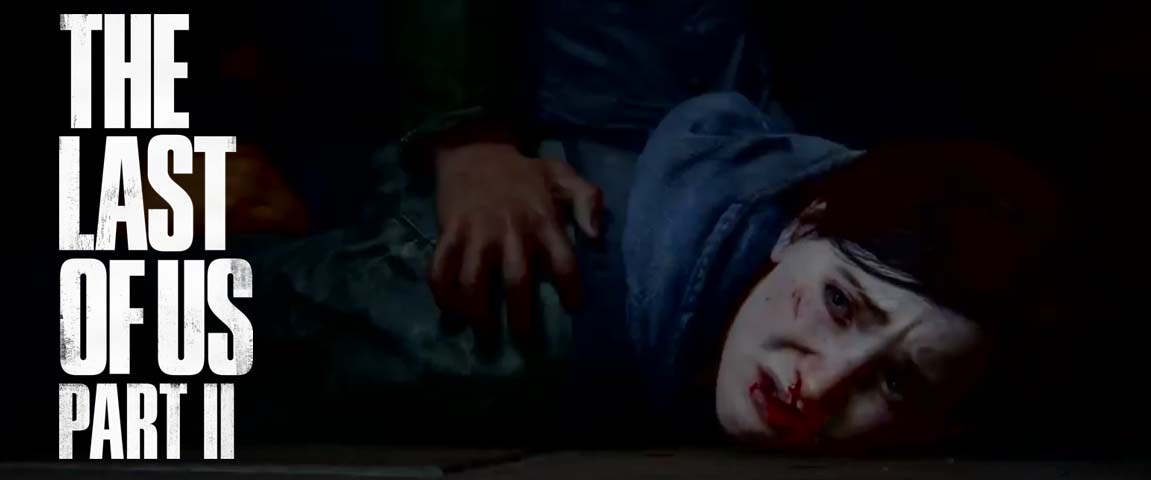
Perspective shifts were used effectively in The Last of Us.
I'm a fairly outspoken critic of the first Last of Us. I felt that the gameplay was fairly shallow (though very well-produced), and focused too strongly on the zombie apocalypse plot at the expense of the surrogate father-daughter story that was being told. The best and most memorable moments were the opening scene in which you play as the scared 10-year-old girl as the zombie apocalypse breaks out, and the part where Joel and Ellie pet the giraffe. And maybe the very end where Joel confronts the doctors in the operating room, for those 40% of us who actually completed the game. And the only enemy encounter that was actually good and meaningful was the one-on-one cat-and-mouse boss fight with the cannibal David in the burning restaurant. Those sequences make up the emotional linchpins of the game and are genuinely moving moments of humanity [or inhumanity], and the perspective shifts that reinforce or contextualize those moments are -- dare I say -- artistic! But then 90% of the actual game that you play is rote cover-based shooting separated by stealth-lite and the occasional "puzzle" that never gets much more complicated than propping a ladder up against a wall.
For being a game about a grieving father eventually finding meaning in a surrogate daughter, it never really let the player act out the interactions between the characters. She was invisible to enemies in stealth and mostly took care of herself in combat. She lacked an upgrade tree and didn't really improve her combat or stealth abilities much over the course of the game, so there was also no ludic development of her character, and the player never feels like you are teaching her how to survive, or doing any of the surrogate father stuff that the game is supposed to be about.
So yeah ... overrated... Still good! But like a 7 instead of a 10 out of 10. "Sacrilege!" I know.
The companion isn't the sole focus of the narrative this time around.
This time, however, the relation between the player character and your NPC companion(s) is not the core of the story. This game is not about the character interactions that the player has no control over; this game is about the violence that the player absolutely has total control over! Ellie and Dina's relationship is the B plot behind the revenge plot, and gets further relegated to a C or D plot in the second half of the game. They're already friends/lovers before the game even begins, so there isn't much in the way of building a relationship. In fact, Ellie's story this time around seems to be more about how being a moody, self-absorbed teenager just pushes Ellie away from the people who care about her. It's more a game about being anti-social, which fits much better with both games' core gameplay.
Cycle of Violence
Now, I cannot talk about the artistic merit of the game without talking about the back half of the campaign. Naughty Dog may have embargoed publications from reviewing the second half of the game, but I'm not going to let that stop me from talking about it. Naughty Dog has no place telling critics or reviewers what they can and cannot tell consumers about the game. I'm personally not offended by the second half of the game like some other people are (I think it's the better half of the game, and Naughty Dog is lucky that I'm going to talk about it, because otherwise the game is a D-). I am, however, offended by Naughty Dog thinking they can impose a muzzle order on reviewers, even if it genuinely was in the interest of "not spoiling the game" (as opposed to just trying to hide a controversial element of design that might turn off some consumers). So yeah, I'm going to try to avoid specific spoilers of major plot developments, but this review will contain minor or moderate spoilers about the overall structure of the game. [More]
|

| 12 | | | | | | | 60 | | 11 | | | | | | | 55 | | 10 | | | | | | | 50 | | 09 | | | | | | | 45 | | 08 | | | | | | | 40 | | 07 | | | | | | | 35 | | 06 | | | | | | | 30 | | 05 | | | | | | | 25 | | 04 | | | | | | | 20 | | 03 | | | | | | | 15 | | 02 | | | | | | | 10 | | 01 | | | | | | | 05 |
|